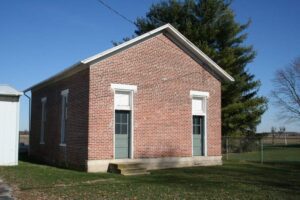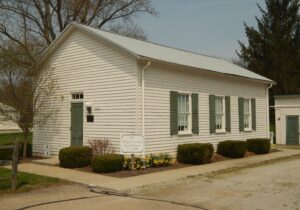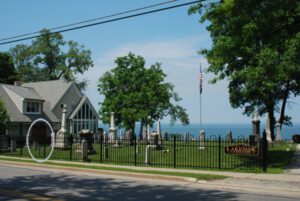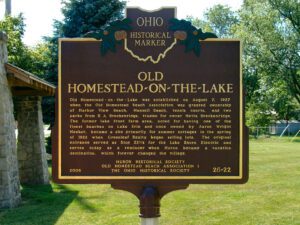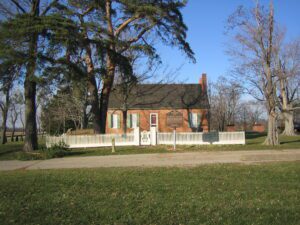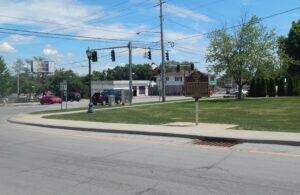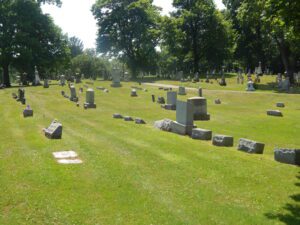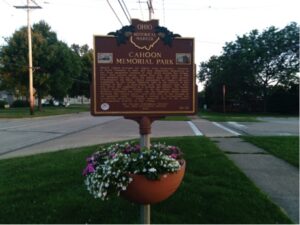, OH
Elizabeth Township was founded in 1807. The Elizabeth Township House was built about 1870, serving as the community’s assembly hall. The building is similar to the seven remaining one-room, brick schoolhouses, built throughout the township between 1868 and 1873. In 1997, the township was added to the National Register of Historic Places as Ohio’s first rural historic district. The district includes all of Elizabeth Township and parts of Staunton and Bethel townships. This marker erected to commemorate the 200th anniversary of the township’s founding.
, OH
On April 20, 1857, the trustees of Morgan Township met in Okeana to obtain a lot for the township house. From a quarter mill tax levy, $850 was budgeted for a house and lot. Money expended on the project included $50 for the lot, $650 for the construction of the building, $41 for fencing, $12.60 for twelve chairs, and $10.25 for a table. Since its completion in 1858, this meeting house has been used for trustee meetings, a voting precinct, village singing schools and concerts, public school, bank, and township garage. The trustees moved to a new building across the street in 1972 and into their Chapel Road complex in 2000.
, OH
Laid out in 1814, Lakeside Cemetery became the first public burying ground in Dover Township, an area that now includes Bay Village, Westlake, and the northern portion of North Olmsted. Reuben Osborn (1778-1860) arrived in Dover on October 10, 1810, but returned to New York. He settled on this land with his wife Sarah Johnson Osborn (1779-1856) and family in 1811, later purchasing most of the plot where the cemetery would be established from Philo Taylor. Sarah’s sister, Rebecca Porter, and her infant son were the first to be buried here; they were killed when their boat capsized at the mouth of the Rocky River in 1814. Including land purchased in 1877, the cemetery currently spans half an acre. Although not recorded until 1879, there are over 270 known burials. Among those interned here are veterans from the Revolutionary War, the War of 1812, the Civil War, the Spanish-American War, and World War I.
, OH
Old Homestead-on-the-Lake was established on August 7, 1927, when the Old Homestead Beach Association was granted ownership of Harbor View Beach, Mansell Beach, tennis courts, and two parks from R. A. Breckenridge, trustee for owner Metta Breckenridge. The former lake front farm area, noted for having one of the finest beaches on Lake Erie and once owned by Aaron Wright Meeker, became a site primarily for summer cottages in the spring of 1922 when Greenleaf Realty began selling lots. The original entrance served as Stop 22 1/2 for the Lake Shore Electric and serves today as a reminder when Huron became a vacation destination, which forever changed the village.
, OH
As Oxford Township was developing in the mid-1800s, a cluster of farmsteads near its northern border developed and was designated the “Doty Settlement.” As was the custom, the community took its name from a prominent family in the area. In or near the settlement were a church and cemetery, a school, a blacksmith shop, a sawmill, a distillery, a furniture shop, and a fulling mill for cleansing, shrinking, and thickening cloth. With the frontier spirit of self-reliance, it was seldom necessary to travel several miles into Oxford village for additional goods or services. Working together, the community farmed local fields and bartered for other items. Men, women, and children worked long, hard hours in the fields harvesting corn and wheat. It is evident that these families, living in an agricultural society, possessed many useful skills for surviving in the Ohio country.
, OH
Activity of the Underground Railroad is believed to have begun in Brookfield Township around 1838 with the first known runaway slaves, two women, to pass through in 1843. Freedom seekers moved north using a system of routes known by operators, or “conductors”. Trumbull County reputedly had over 150 miles of Underground Railroad routes, which would have made it the largest network in Ohio. The slaves that passed through Brookfield Township came mostly from the Youngstown, Poland, and the Canfield areas. From Brookfield they were sent north to Hartford, Kinsman, Burghill, and Vienna ultimately headed to Canada.
, OH
For more than two centuries, this burial ground has been a final resting place for those individuals whose lives represented the community history of Canfield. The earliest existing tombstone marks the death of Huldah Tanner in 1803. Seven earlier deaths in Canfield Township are recorded from 1798 to 1803, but the gravesites are unknown. Elijah and Rhoda Hopkins Wadsworth formally deeded the cemetery to the citizens of Canfield in 1810 with a first edition of land donated by Matthew B. Whittlesey in 1811. In 1862-1863, the graveyard was again enlarged. For seventy years the cemetery and fencing were maintained on a volunteer basis. When the Village of Canfield was incorporated in 1869, the care and management was vested in a board of trustees. (continued on other side)
, OH
Joseph Cahoon brought his family from Vergennes, Vermont, to Dover Township in 1810, and they established themselves as the first permanent settlers in what would become Bay Village, Ohio. The Cahoon house, called Rose Hill, was built in 1818 and replaced the log cabin the family built upon their arrival. Granddaughter Ida Maria Cahoon bequeathed her family’s 115-acre homestead as the Cahoon Memorial Park to the citizens of Bay Village in 1917. In accordance with the family’s wish, Rose Hill serves the community as a museum and library. The Reuben Osborn House (1815), thought to be the oldest frame house between Cleveland and Lorain, and the Community House (1882), formerly the Cahoon barn, join Rose Hill on the grounds of the memorial park. Providing a variety of recreational and educational activities, Cahoon Memorial Park is the center of community activity in Bay Village.


